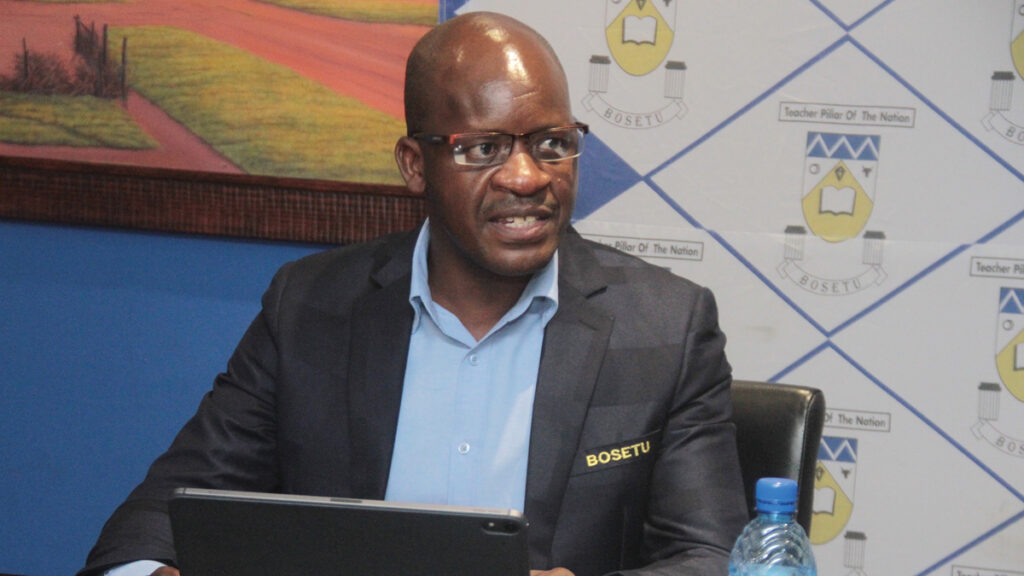‘This is a challenge not peculiar to teachers’ – Dr Nyanga
OARABILE MOSIKARE
editors@thepatriot.co.bw
As schools welcomed the last batch of learners last week, it has since emerged that some educators have refused to take the jab against the deadly pandemic, citing religious convictions.
BOSETU Secretary General, Tobokani Rari confirmed being aware that some educators did not take the jab despite the availability of the vaccine. He, however, said the campaign to force government to vaccinate teachers as a priority has borne some fruits. “Government yielded ultimately to our demands. Society also understood our course and supported us,” said Rari.
Vaccination sites dedicated only to teachers, mostly in schools, were opened across the country. According to Government updates, more than 85% of the teaching cadres and support staff in schools have been vaccinated, which has been hailed as a good turn up. “There are of course teachers and some support staff who have not been vaccinated owing to various reasons. Some of them were on quarantine, isolation and some had some various ailments at the time. Of course there are those who called our offices indicating that they do not want to take the jab because of personal reasons such as religious beliefs,” said Rari, explaining that the union leadership has been encouraging all their members to take the vaccine to increase protection against the deadly Covid19 virus.
With regard to those who refuse to vaccinate, Rari said they could only encourage them to vaccinate, but the rest remains with government to decide as to what would happen to citizens who refuse to vaccinate. “Vaccine hesitancy is not only in the teaching faternity, it is there in the whole society,” he cautioned.
Dr Christopher Nyanga, the Ministry of Health and Wellness Chief Public Relations Officer concurred that there are some teachers who did not come for vaccination despite having been given an opportunity to do so. “Some may not have come due to religious beliefs as you say,” he opined, explaining that others may not have managed because they were on isolation/quarantine at the time the vaccination process was ongoing, while others were reluctant to take the Covid19 jab for personal fears like whether or not vaccines are safe for them.
“Since this is not a challenge peculiar to teachers alone, the Ministry is engaged in a robust public education initiative to teach people about the benefits of Covid19 vaccines in fighting against the pandemic. The good news however, is that those unwilling to take vaccines are in the minority compared to multitudes that have so far taken them, especially in the teaching fraternity where so far more than 85% have already taken the jab,” said Dr Nyanga.
Like in many other countries across the world, taking Covid19 vaccines is still voluntary in Botswana. “Therefore, no consideration has as of now been made to force people to be vaccinated. Government is so far satisfied with the level of interest for the vaccination process and will continue to educate the public about the importance of getting vaccinated,” Dr Nyanga emphasised.
Commenting on the legality of forcing people to take the vaccine by imposing restrictions to workplaces or businesses or stadia for the unvaccinated as it is happening in some jurisdictions, attorney Martin Dingake said this seems to be a growing phenomenon. Dingake said President Cyril Ramaphosa of South Africa has mooted the idea of COVID passports. In Zimbabwe, he said civil servants must take the jab or resign. Discovery Insurance Limited is also putting similar measure on their employees and clients who take insurance policies with them.
In New Zealand, he explained that an employee was dismissed for refusing to take COVID vaccine. “In our context, I think the Constitution is instructive in permitting such types of discrimination on justification basis of public health. You will know of our Zezurus who previously refused to have their children immunise. The court directed that they be immunized,” he said.
“Nations are likely to control movements of people into their countries by insisting on vaccination as sine qua non. Under international law, and in exercise of their sovereignty, nations have absolute discretion as to whom they can allow to enter their country and under which conditions,” said Dingake.
Background
In July, Botswana Teachers Union (BTU) and Botswana Sectors of Educators Trade Union (BOSETU) took the battle far vaccination to government demanding closure of schools until all teachers have taken a jab, following hundreds of Covid19 infections and related deaths. At the time BOSETU and BTU said they would not let teachers return to work when schools reopen if they were not vaccinated. The two unions met and resolved that, looking at the high number of teachers dying due to coronavirus, it would be senseless for them to return to work.
The unions were ready to launch a legal battle if government reopened schools, ignoring their ‘No Vaccine, No Classes’ campaign. Government relented and extended closure of schools by three weeks to prioritise vaccination of teachers, which are classified as essential service workers.
